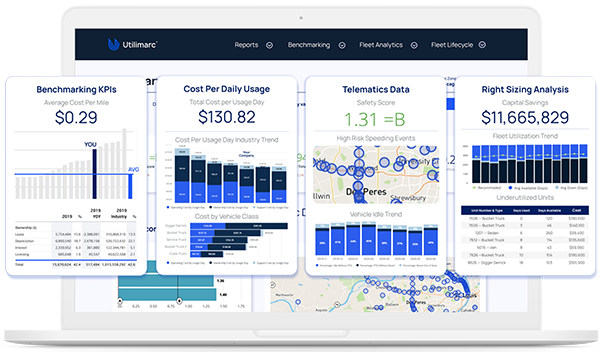Business intelligence seems to be one of those buzzwords that companies throw around when talking strategy and future-proofing solutions, but many find it hard to define. Is it a system? A service? A strategic approach? In some ways, it is all the above.
In brief, business intelligence is the technology and practice used to perform data analytics and reporting for companies. It offers a view of current, historical, and predictive data all consolidated onto one platform. However, the BI used for an overseas shipping company, or a major manufacturer is completely different from the BI used for managing fleets. Successful BI implementation is well-paired with people who know the ins and outs of the industry and what the data represents.
Regardless of the industry though, BI is implemented with one common goal in mind –to help in making informed, data-backed business decisions.
What BI can do for fleets
For a fleet manager who isn’t an expert in technology or data analysis, it could be difficult to understand why business intelligence is such a necessary tool for running a fleet today. Here are just some of the many ways that a BI platform can act as a fleet’s strongest tool.
1. Give you the time to do your job
Fleet managers have enough on their plate, and they are hired to do what they know– keep a fleet running. However, this is nearly impossible to do efficiently when more than 70 percent of their time is spent simply sifting through and consolidating data. Not only does this take managers away from their other responsibilities, but this leaves little time for identifying opportunities and rethinking strategy.
For someone who has been working with bucket trucks or digger derricks for 30 years, managing endless data reports on a regular basis can be tedious, daunting, and frankly, a waste of time. Luckily, the job of a BI platform is to help you do your job. Data is cleaned, standardized, and framed through a lens that makes sense for each fleet, saving managers hours of trying to make sense of unorganized data.
2. Cut out gray area guesswork
Any fleet manager knows the vast amount of money that goes into managing a fleet. Vehicles can cost upwards of half a million, fuel is a constant expense and maintenance doesn’t come cheap. This is both good news and bad news for a fleet using BI. While there is huge opportunity for cost reduction, there is also great probability that you’re overspending in areas that you’re unaware of.
This is where a BI platform has your back. By pointing out specific areas where your team is underperforming or overspending, managers can turn to statistical evidence to back up their decision to add more vehicles, cut back on personnel or reduce idling time. Further, business intelligence removes the risk of inconsistencies that are common with manual reporting. Ultimately, no more guesswork and executives can be confident in the decisions being made.
3. Customized metrics based on your goals
The great thing about business intelligence is its ability to be personalized to its user. The platform can be set to measure metrics that make sense for your fleet, which is key as no two fleets are the same.
Managers can gain insight into how to right-size their fleet, optimize the availability of vehicles, and differentiate between good and bad idling, among many other things. BI puts its user and their goals at the forefront.
4. Replace disparate legacy systems
Many fleet managers are currently using whatever data solution was in place when they took over the role, and the fact is that these legacy systems are likely outdated and unreliable.
Business intelligence platforms replace outdated data management systems and allow managers to unify disconnected data streams such as fleet management systems, telematics, fuel cards, drive cameras and ERP software. This allows for much deeper analysis than older systems could handle, complete with easy-to-read reports and visuals.
How our BI differs from the rest

What Utilimarc offers is more than just a service – it’s people and a platform. Our dedicated team of analysts are well versed in the world of fleet and work hard to solve managers’ data pain points.
“We pride ourselves in our ability to bring the technology and domain-specific expertise together with our people. It allows us to really deliver on these problem statements that don’t allow our clients to support rapid change.”- Chris Shaffer, Utilimarc CEO
Our analysts work directly with fleet managers to identify fleet goals and set up custom metrics to measure progress in annual benchmarking reports and daily analytics dashboards. Managers can even opt to do special projects with Professional Services such as fleet rightsizing, lifecycle projections, fuel and maintenance cost reporting and more. Having access to unified and standardized data also allows managers to perform peer-to-peer comparisons and see exactly how fleet performance stacks up against industry competitors.
Ultimately, all of this is done with the purpose of supporting managers in reaching their goals and optimizing fleet operations overall. BI is about using data to your advantage, as your greatest tool, and using those actionable insights to make informed decisions in your fleet management strategy.
If you’re interested to see how our platform and team of analysts are driving fleet success with telematics data, schedule a demo with us today.
Sponsored by 
by Michael Carr, Account Manager at Utilimarc
Source: https://www.fleetforward.com/




